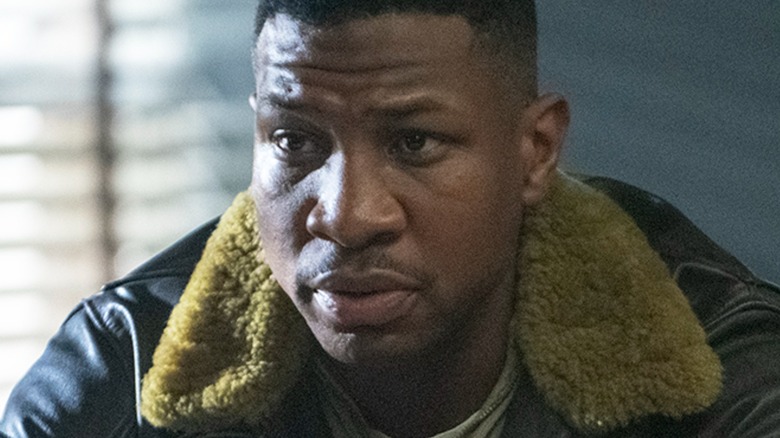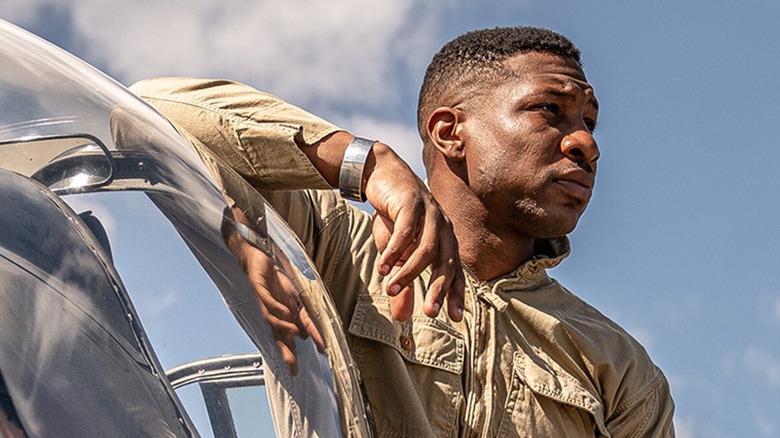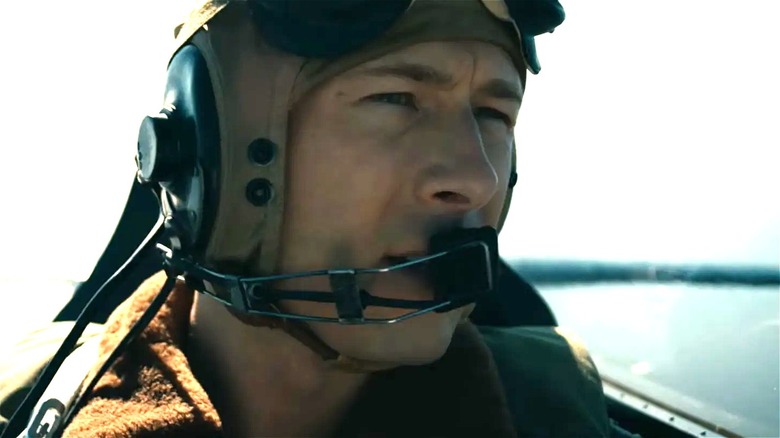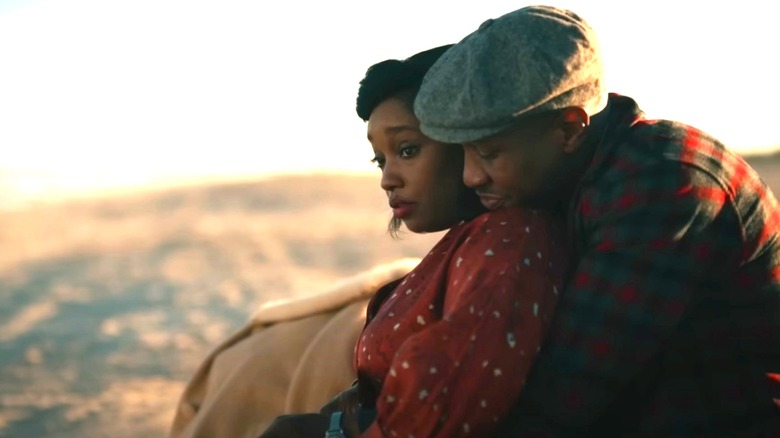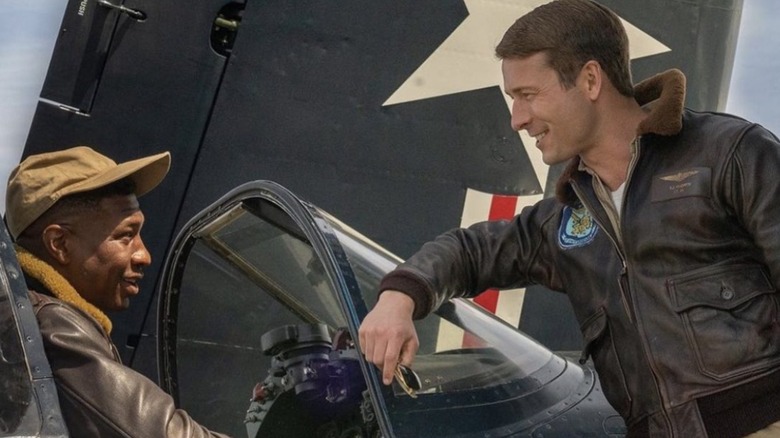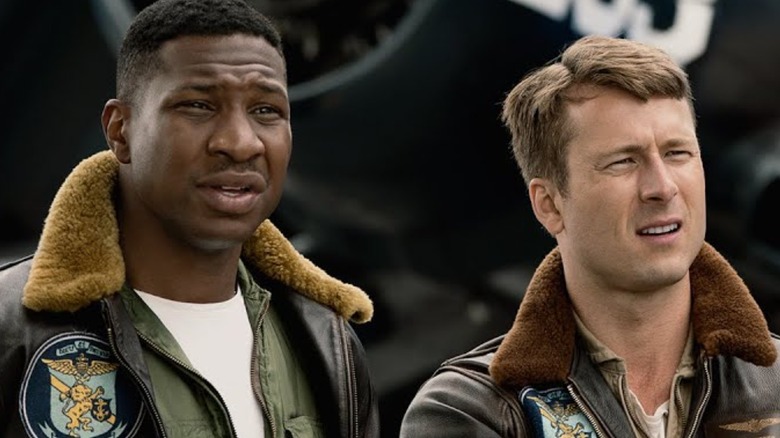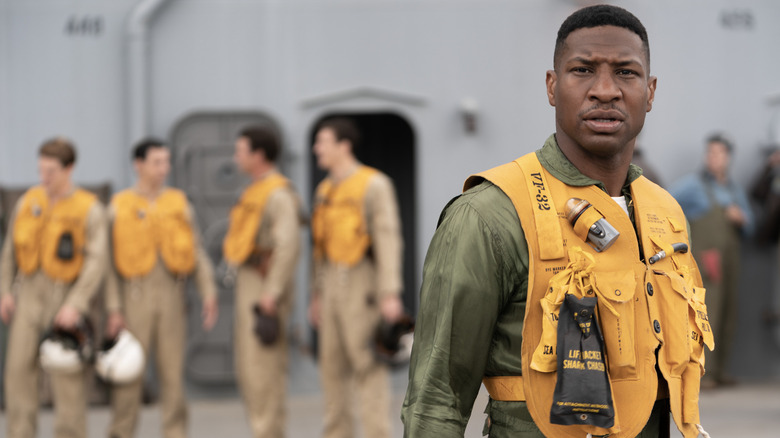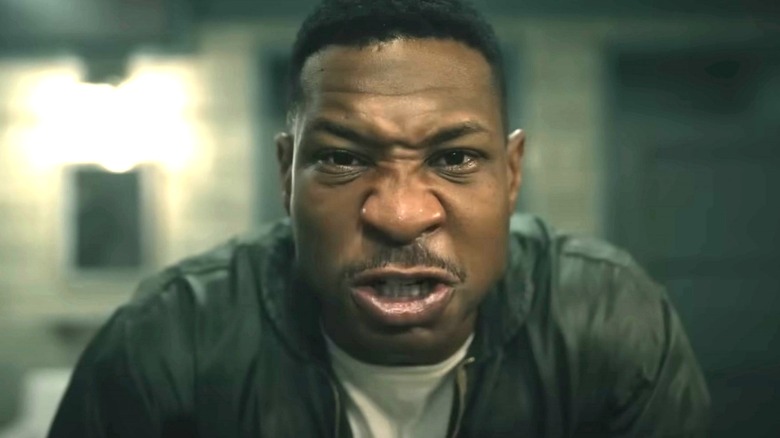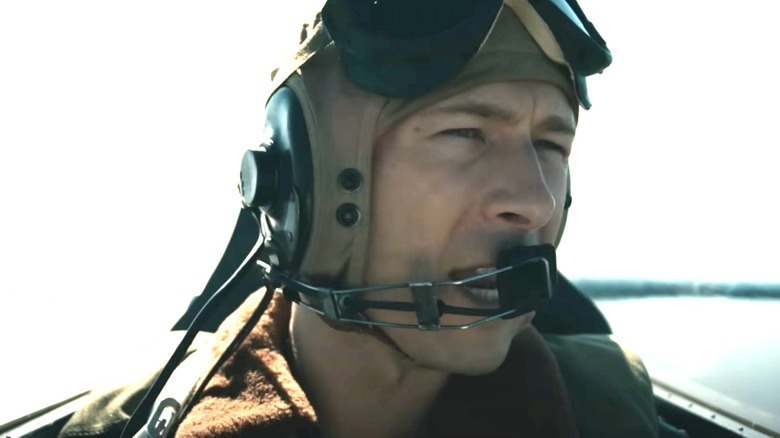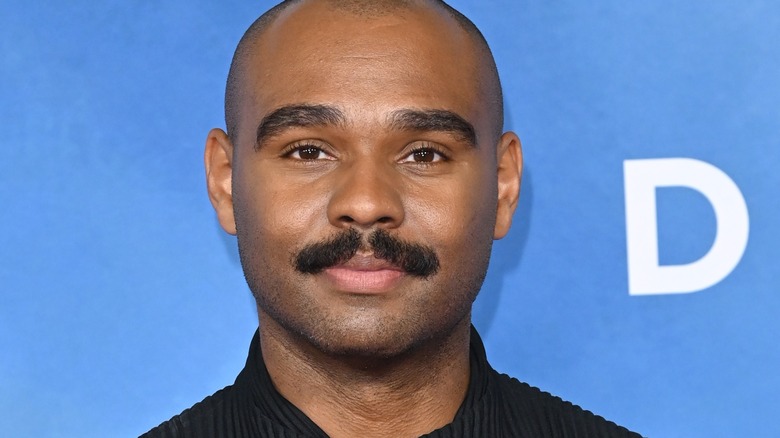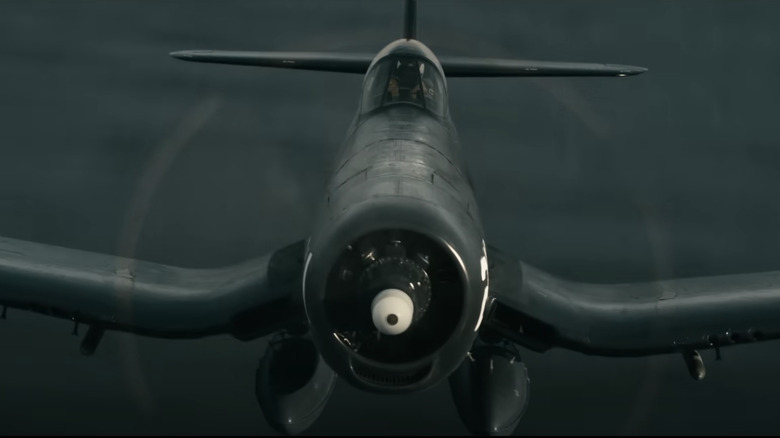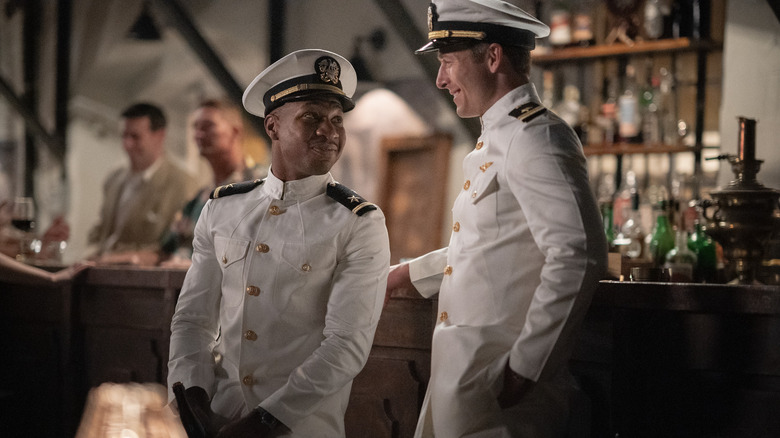The Ending Of Devotion Explained
Based on the incredible true story of Ensign Jesse Brown and Lieutenant Tom Hudner, "Devotion" tells the story of the first Black aviator in the U.S. Navy and the camaraderie he shared with his wingman in the Korean War. "Devotion" stars an incredible cast, including Jonathan Majors of "Lovecraft Country" and "Ant-Man and the Wasp: Quantumania" as Jesse Brown. Glen Powell, fresh off of "Top Gun: Maverick," plays Brown's wingman and eventual friend Lieutenant Tom Hudner.
While "Devotion" is a bit of slow burn, its emotional narrative is rich with themes of prejudice and allyship. Powell felt particularly passionate about bringing the story to the screen, serving as not only star but executive producer. As Powell told Variety, he read Adam Makos' book, "Devotion: An Epic Story of Heroism, Friendship, and Sacrifice," and felt that the story was destined for the big screen. "Reading it, I remember thinking that it was incredible that I'd never heard this story before," he recalled. "It felt like when I read 'Hidden Figures' for the first time and was like, 'Is this actually true? This is incredible, why haven't I heard it before?'"
Since "Devotion" is a period film, audiences are treated to a peek into 1950s Cannes and even a few scenes with a young Elizabeth Taylor (Serinda Swan). The particular racist attitudes of the time are depicted, though "Devotion" is unique in how it deals with them. Rather than explicitly showing bigoted encounters on screen, the filmmakers have instead opted for Brown to recount his shocking experiences to the audience from his own perspective. Let's take a look at how "Devotion" ends, and what we can learn from the story of Brown and Hudner.
The heartwrenching death of Jesse Brown
Jonathan Majors stars as Jesse Brown, a skilled pilot and the first Black aviator in the Navy. Majors has earned major awards and acclaim over his acting career, and he brings that gravitas and talent to his portrayal of Brown. At the beginning of "Devotion," Brown is wary of Hudner, clearly unsure about his new wingman's attitudes toward Black men in the military. Over the course of the movie, though, Brown and Hudner develop a strong friendship.
At several points in the film, Brown recites to the mirror, almost breaking the fourth wall, listing all the horrific things that have been said to him during his military experience and his personal life. It's jarring for the audience to hear the slurs and insults he throws at himself. Brown never explains whether this is an act of catharsis or simply a reminder of how far he's come, but it's a powerful reminder for the audience of how much overt racism and disdain Brown faced during his military career.
But in the end, Hudner's friendship and Brown's love for his wife Daisy that shine through all the hardship of his life story. "Tell Daisy I love her" are Brown's final words to Hudner when he's stuck in his downed plane. As Brown slips into unconsciousness and it becomes clear that there's nothing to be done for him, Hudner leaves, haunted by the feeling that he still hasn't done enough for his friend.
A deliberate crash
Glen Powell stars as Tom Hudner, Jesse Brown's fellow pilot and friend in "Devotion." Powell is no stranger to period dramas, having portrayed John Glenn in 2016's "Hidden Figures." Although Hudner and Brown eventually become friends, Hudner unintentionally creates issues for Brown early in their relationship. When Brown disobeys an order and takes down a bridge in Korea, Hudner puts the incident in his report, endangering Brown's career in the military. Hudner attempts to fix the situation, but Brown informs him that all he needs is for Hudner to be his wingman instead of using him to assuage his white guilt.
After Brown crashes, Hudner circles the crash site, trying to give him verbal instructions on how to escape the downed plane. Once it becomes apparent that Brown is trapped in the cockpit, Hudner deliberately crashes his own plane and attempts to free him, even taking an ax to the side of the aircraft. Ultimately, though, Hudner has to leave the site, knowing that with Brown's injuries, he won't survive.
The final scenes of "Devotion" show Hudner receiving the Medal of Honor for his rescue attempt. In their final conversation together, Hudner tells Daisy Brown that he feels guilty he wasn't able to save her husband or even bring back his body — a regret that we learn will stay with him for the rest of his life.
The loss of a beloved husband
Christina Jackson ("Boardwalk Empire") is Daisy, the wife of Jesse Brown in "Devotion." Smart and capable, Daisy is friendly with Hudner, encouraging Jesse to invite his wingman for a drink. As Brown and Hudner prepare to ship out, training with the new planes the Navy has developed, Daisy sits with Hudner in the kitchen and asks him to keep an eye on her husband and ensure he returns home.
One of the best aspects of "Devotion" is the relationship between Jesse and Daisy, who have a loving and supportive marriage. Even while he's abroad he makes romantic gestures like setting up a scavenger hunt for her birthday, and some of the film's final images are of Daisy and their daughter Pamela, as we hear Jesse's voice reading his letters to Daisy. As Jesse starts to lose consciousness in the cockpit of his downed plane, he asks Hudner, "Tell Daisy I love her."
Daisy is present for the ceremony where Hudner receives his Medal of Honor. Sitting on a bench afterward, Hudner expresses his regret that he wasn't able to save Jesse. "That was never your job," she tells him. "I asked you to be there for him, and you were." This final line that circles back to Jesse's request that Hudner stops trying to fix things for him, and instead just be his wingman.
Friendship is at the core of Devotion
The friendship between Brown and Hudner is undoubtedly the heart of the film. During their time together, Hudner often sticks up for Brown and tries to shut up the other men when they make inappropriate and racist remarks toward him. Although Hudner has a lot to learn about allyship and how to be a friend to Brown, his final actions at the end of the film, deliberately crashing his plane and trying to save Brown, demonstrate the closeness of their relationship.
In an interview with Variety, Powell was asked why he connected with the story of "Devotion" enough to sign on as both star and producer. He answered that it was the film's central narrative of friendship that he found most compelling. "I remember thinking about how people seem to be passive in terms of the way they're friends," Powell explained. "You're not putting skin in the game. You support them to a degree, but it only goes so far. So it was kind of on my head and heart, this idea of how to be a great friend."
Since the friendship between Hudner and Brown must deal with race and the inequalities over how they're treated within the unit, Powell felt that "Devotion" exemplified this issue. "I felt very uncomfortable in the fact that I wanted to be a friend, and I wanted to be an ally, and I didn't know what was being perceived as being real, or what was being perceived as obligatory." Part of being a friend to Brown means that Hudner must learn to "jump in the water" and actually stand by his friend. Crashing his plane and physically rushing over to try and pull Brown from the wreckage exemplifies this.
What is real allyship in the face of racism?
One of the main questions that "Devotion" asks is what real allyship looks like. This a question that Brown pushes Hudner to confront when Hudner reports that Brown disobeyed an order during an attack run, as Brown explains, "A slap on my wrist is not the same as a slap on yours." Hudner attempts to rectify the situation by asking each of the other pilots to write a testimony that Brown acted appropriately. After Brown scoffs at the official report, Hudner tells him, "I'm sticking my neck out for you." He responds, "Sticking your neck out with a piece of paper? That paper cost you nothing! Nothing! Do you know how tired I am of people looking down on me while they try to help me?"
This question, which clearly shocks Hudner as discomfort becomes apparent on his face, causes him to evaluate the help he's offering and even his motive for doing so. Is it guilt? Chastened, he says to Brown, "I'm not looking down on you. What do you want me to do?" Brown shakes his head and answers, "Just be my wingman, that's it. Forget the damn lifesaver and get in the water!"
Majors addressed this moment in the film during an interview with Entertainment Weekly, saying, "What is it to actually partner with somebody? What is actual allyship? It's not writing something on a piece of paper, it's not doing a YouTube chat ... It is an experience. [It is] I'm with you, bro, come hell or high water."
How to be a hero
As a military film, it's no surprise that "Devotion" deals with the idea of heroism versus duty. "Devotion" examines this conflict throughout the film, particularly when Brown ignores an order and rushes back to the bridge to blow it up, thereby completing a mission specifically through disobedience. This yields consequences for Brown when he's reprimanded for his actions after Hudner relates what happened in his report. Is Brown a hero for completing the mission, even though he disobeyed orders to do it? Should Hudner have reported the infraction, even though the consequences for Brown would be higher than for the others in the unit?
As Brown and Hudner argue about the incident in the barracks, we see the complexity inherent in the situation rising to the surface. The mission was complicated and Brown was able to destroy the bridge quickly and safely, even if he did disobey an order. And Hudner realizes that he's created problems for Brown that he never even considered. As Brown does everything he can to be respected for his skills as a pilot, he struggles to find his place within the unit. However, for Black servicemen serving aboard their aircraft carrier, Brown is already a hero. Hudner, on the other hand, must come to grips with the fact that he's considered a hero for trying to save Brown, despite his inability to do so.
For Jonathan Majors, this push and pull between heroism and responsibility, duty and blame, is key to the movie's meaning. As the actor told IndieWire, "We're talking about the relationship between Jesse and Tom and what that did for race relations within America ... This is a piece for the bourgeoisie and the proletariat. Jesse Brown and Tom Hudner are men of the people."
Majors feels the film is relevant for today
America is still reckoning with its racist history and the current systems in place today that continue to perpetuate it. For Majors, one of the reasons he chose to participate in the film was its importance in showcasing the achievements of Jesse Brown. The actor intended to highlight the man's skill and confidence as a pilot. To achieve this, Majors told IndieWire that he tried to showcase the various sides of Brown, wanting to demonstrate that "he walks with the knowing swagger of a man aware of his accomplishments."
Part of portraying Brown was showing how much he'd achieved, particularly in a time when desegregation was very much in its early stages. And yet, for many people of color, these ideas are just as important today; as the actor told Deadline, "Jesse really did it ... and dealt with the trials and tribulations that came with that -– for his ambition, for his love, for his drive ... a boy from Mississippi who touched the sky."
Glen Powell felt a lot of pressure portraying Hudner
While "Devotion" shows off the incredible fortitude and talent of Jesse Brown, it's also about Hudner's own difficulties in understanding the true toll of racism and how to be a better ally to his friend. For Powell, "Devotion" was an important film since it stayed away from the "white savior" narrative (particularly when Brown scolds Hudner for looking down on him in his effort to help) and focused instead on friendship and allyship. Powell told Variety that he wanted "Devotion" to deal with racial issues still being felt throughout America. "When I read this, I thought it felt unbelievably timeless," he explained, "especially as we are going kind of through this weird moment as a country where we're trying to define who we are in the greater picture of things."
Powell also had the unique opportunity to meet with the real Tom Hudner before his death in 2017 (via Cinema Daily). He promised Hudner that he'd do his best to ensure that the amazing story of Hudner and Brown was correctly told. These promises meant that Powell felt intense pressure in how he'd portray this real-life character. As he told Variety, "I'd never been so immersed in an experience in my whole life. And I don't know if I ever will. I mean, this is four years of truly feeling like I was with that man spiritually." Powell even reported that he's stayed in contact with Hudner's family since finishing work on the film.
Director J.D. Dillard had a personal connection to the film
Glen Powell's uncle gave him the book that inspired "Devotion" and after reading it, Powell became obsessed with acquiring the film rights (per The Hollywood Reporter). As executive producer, Powell actually helped to choose the director for the project. When Powell recounted his experience meeting J.D. Dillard, one of the things that impressed him the most was Dillard's personal connection to the subject. "His dad was the second African American Blue Angel," the actor told Variety. "He's got this fascination with aviation."
And for Dillard, bringing that personal experience to the film allowed him to imbue "Devotion" with his admiration for his father. "I was seeing a lot of my dad in that story," he told Deadline. "Both technically and socially, they both dealt with isolation, and there's so many pieces there that I think ultimately just became the DNA of the film." For Dillard, one of the most satisfying aspects of seeing "Devotion" come to fruition was how Majors and Powell became "brothers and friends in this process," as the director told The Hollywood Reporter, just as Hudner and Brown became friends.
Devotion stays true to the actual events
As much as the idea of a fighter pilot deliberately crashing his plane to rescue his friend feels like a Hollywood movie, surprisingly, the dramatic events between Tom Hudner and Jesse Brown did happen in real life. Brown was an outstanding pilot who passed his rigorous Navy training with flying colors and was even profiled by Life magazine, just like in the film.
In fact, when Brown's plane went down and Hudner realized his wingman was trapped in the cockpit, their commanding officer told him not to attempt to land, saying, "If a plane goes down, that's one down. We don't need Hollywood stuff" (via Naval History and Heritage Command). Hollywood stuff it was, though. Even Brown's last words in the film are historically correct, as he told Hudner to tell Daisy how much he loved her.
Powell talked about how overwhelmingly significant it was to meet the real Tom Hudner. "I really got to look the man in the eyes and understand who Tom was," he told Deadline. "I got to see an entire room in his house that was all of the remnants and reminders of an event that happened in December of 1950." Though as Powell learned, "It wasn't a celebration, it was a constant reminder of a friend he lost and I carried that weight into this role." During their time together, Powell promised Tom Hudner that he would do everything in his power to carry forward his legacy and that of Jesse Brown (via Cinema Daily).
Devotion has a connection to Top Gun: Maverick
Shortly before the release of "Devotion" in 2022, Tom Cruise reprised his role as Maverick in the long-awaited sequel "Top Gun: Maverick." Hopefully, eagle-eyed audiences noticed Glen Powell as Lieutenant Jake Seresin, aka Hangman. When Glen Powell got the role in "Maverick," he already had "Devotion" in development. For many actors, having two roles in movies of the same genre in the same release year might cause conflict between studios. While "Top Gun: Maverick" is more of a contemporary action movie and "Devotion" is a period drama, they both focus on the exploits of elite fighter pilots.
Fortunately, not only did Glen Powell fit both projects into his schedule, he even got Tom Cruise's blessing. Unsure about the "Top Gun: Maverick" role, Powell called Cruise to ask for his advice, as he told The Hollywood Reporter. "I said, 'Hey, Tom, I already have a naval aviation movie that's really close to my heart.'" Cruise reportedly responded, "There's room for two. You can do 'Top Gun.' You can do 'Devotion.' You don't have to choose."
Since then, Powell's expressed gratitude to Cruise and the two studios involved (Black Label and Sony) for the opportunity to make both films, telling THR, "I feel like these are two movies that could not be more different from each other, but really complement just the love of aviation and the legacy of our men and women in uniform."
